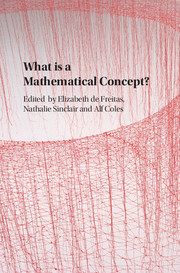38 results
Part V
-
- Book:
- What is a Mathematical Concept?
- Published online:
- 26 July 2017
- Print publication:
- 22 June 2017, pp 159-202
-
- Chapter
- Export citation
Contents
-
- Book:
- What is a Mathematical Concept?
- Published online:
- 26 July 2017
- Print publication:
- 22 June 2017, pp v-vi
-
- Chapter
- Export citation
Introduction
-
- Book:
- What is a Mathematical Concept?
- Published online:
- 26 July 2017
- Print publication:
- 22 June 2017, pp 1-16
-
- Chapter
- Export citation
Part II
-
- Book:
- What is a Mathematical Concept?
- Published online:
- 26 July 2017
- Print publication:
- 22 June 2017, pp 53-90
-
- Chapter
- Export citation
Part III
-
- Book:
- What is a Mathematical Concept?
- Published online:
- 26 July 2017
- Print publication:
- 22 June 2017, pp 91-122
-
- Chapter
- Export citation
Copyright page
-
- Book:
- What is a Mathematical Concept?
- Published online:
- 26 July 2017
- Print publication:
- 22 June 2017, pp iv-iv
-
- Chapter
- Export citation
Notes on Contributors
-
- Book:
- What is a Mathematical Concept?
- Published online:
- 26 July 2017
- Print publication:
- 22 June 2017, pp ix-xii
-
- Chapter
- Export citation
Part I
-
- Book:
- What is a Mathematical Concept?
- Published online:
- 26 July 2017
- Print publication:
- 22 June 2017, pp 17-52
-
- Chapter
- Export citation
4 - Concepts as Generative Devices
- from Part II
-
-
- Book:
- What is a Mathematical Concept?
- Published online:
- 26 July 2017
- Print publication:
- 22 June 2017, pp 76-90
-
- Chapter
- Export citation
Part VIII
-
- Book:
- What is a Mathematical Concept?
- Published online:
- 26 July 2017
- Print publication:
- 22 June 2017, pp 267-284
-
- Chapter
- Export citation
Images
-
- Book:
- What is a Mathematical Concept?
- Published online:
- 26 July 2017
- Print publication:
- 22 June 2017, pp vii-viii
-
- Chapter
- Export citation
Part VII
-
- Book:
- What is a Mathematical Concept?
- Published online:
- 26 July 2017
- Print publication:
- 22 June 2017, pp 235-266
-
- Chapter
- Export citation
Part VI
-
- Book:
- What is a Mathematical Concept?
- Published online:
- 26 July 2017
- Print publication:
- 22 June 2017, pp 203-234
-
- Chapter
- Export citation
Index
-
- Book:
- What is a Mathematical Concept?
- Published online:
- 26 July 2017
- Print publication:
- 22 June 2017, pp 285-288
-
- Chapter
- Export citation

What is a Mathematical Concept?
-
- Published online:
- 26 July 2017
- Print publication:
- 22 June 2017
Part IV
-
- Book:
- What is a Mathematical Concept?
- Published online:
- 26 July 2017
- Print publication:
- 22 June 2017, pp 123-158
-
- Chapter
- Export citation
3 - Diagrams, gestures, movement
-
- Book:
- Mathematics and the Body
- Published online:
- 05 July 2014
- Print publication:
- 02 June 2014, pp 62-85
-
- Chapter
- Export citation
5 - Materialist approaches to mathematics classroom discourse
-
- Book:
- Mathematics and the Body
- Published online:
- 05 July 2014
- Print publication:
- 02 June 2014, pp 111-139
-
- Chapter
- Export citation
Bibliography
-
- Book:
- Mathematics and the Body
- Published online:
- 05 July 2014
- Print publication:
- 02 June 2014, pp 233-256
-
- Chapter
- Export citation
7 - Mapping the cultural formation of the mathematical aesthetic
-
- Book:
- Mathematics and the Body
- Published online:
- 05 July 2014
- Print publication:
- 02 June 2014, pp 172-199
-
- Chapter
- Export citation

